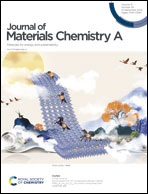Positive electrode–Li metal crosstalk behavior-induced morphology change of Li deposits†
Abstract
The anomalous crosstalk behavior in lithium metal batteries using DME-based electrolytes is investigated. The oxidative decomposition of the LiFSI-DME electrolyte forms a film on the positive electrode and soluble products simultaneously. The quantity of soluble decomposition products is directly proportional to the cycling voltage; a 4.2 V cycled NCM811 positive electrode exhibits severe degradation and significant product yield. The soluble degradation products readily diffuse to the Li metal and form a resistive film. The film generated on the Li metal increases the polarization of Li deposition. The altered Li cycling kinetics from the crosstalk affects the deposition morphology of Li, leading to the formation of porous and dendritic deposits with a 4.2 V cycled NCM811 electrode, compared to the dense morphology observed in cells comprising LFP and Li. This new finding of soluble oxidative decomposition product-induced failure highlights a route to overcome the challenge of developing stable lithium metal batteries.



 Please wait while we load your content...
Please wait while we load your content...